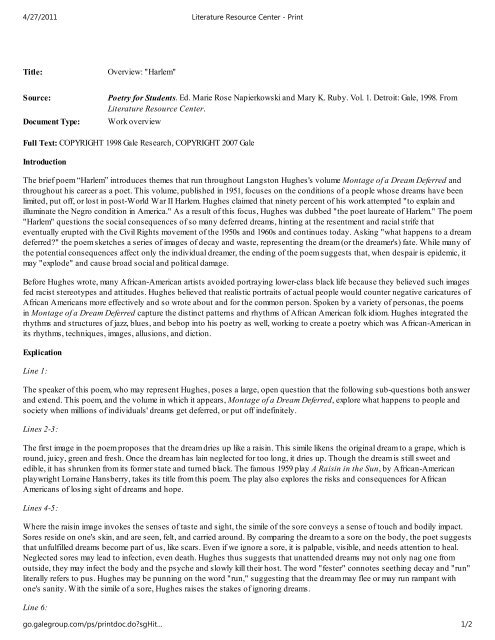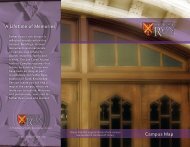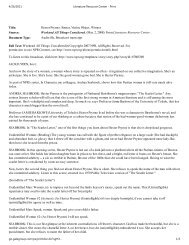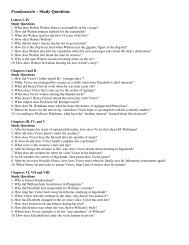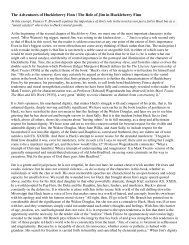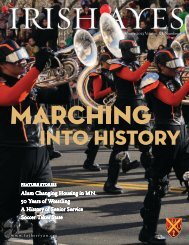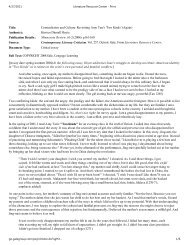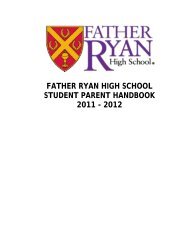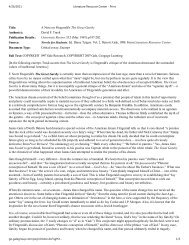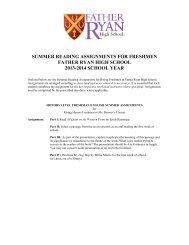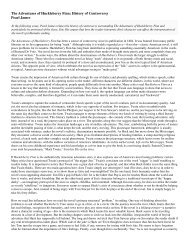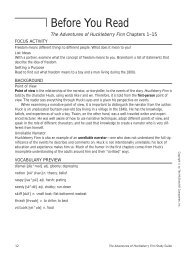You also want an ePaper? Increase the reach of your titles
YUMPU automatically turns print PDFs into web optimized ePapers that Google loves.
4/27/2011 Literature Resource Center - PrintTitle:<strong>Overview</strong>: "<strong>Harlem</strong>"Source:Document Type:<strong>Poetry</strong> <strong>for</strong> <strong>Students</strong>. Ed. Marie Rose Napierkowski and Mary K. Ruby. Vol. 1. Detroit: Gale, 1998. FromLiterature Resource Center.Work overviewFull Text: COPYRIGHT 1998 Gale Research, COPYRIGHT 2007 GaleIntroductionThe brief poem “<strong>Harlem</strong>” introduces themes that run throughout Langston Hughes's volume Montage of a Dream Deferred andthroughout his career as a poet. This volume, published in 1951, focuses on the conditions of a people whose dreams have beenlimited, put off, or lost in post-World War II <strong>Harlem</strong>. Hughes claimed that ninety percent of his work attempted "to explain andilluminate the Negro condition in America." As a result of this focus, Hughes was dubbed "the poet laureate of <strong>Harlem</strong>." The poem"<strong>Harlem</strong>" questions the social consequences of so many deferred dreams, hinting at the resentment and racial strife thateventually erupted with the Civil Rights movement of the 1950s and 1960s and continues today. Asking "what happens to a dreamdeferred?" the poem sketches a series of images of decay and waste, representing the dream (or the dreamer's) fate. While many ofthe potential consequences affect only the individual dreamer, the ending of the poem suggests that, when despair is epidemic, itmay "explode" and cause broad social and political damage.Be<strong>for</strong>e Hughes wrote, many African-American artists avoided portraying lower-class black life because they believed such imagesfed racist stereotypes and attitudes. Hughes believed that realistic portraits of actual people would counter negative caricatures ofAfrican Americans more effectively and so wrote about and <strong>for</strong> the common person. Spoken by a variety of personas, the poemsin Montage of a Dream Deferred capture the distinct patterns and rhythms of African American folk idiom. Hughes integrated therhythms and structures of jazz, blues, and bebop into his poetry as well, working to create a poetry which was African-American inits rhythms, techniques, images, allusions, and diction.ExplicationLine 1:The speaker of this poem, who may represent Hughes, poses a large, open question that the following sub-questions both answerand extend. This poem, and the volume in which it appears, Montage of a Dream Deferred, explore what happens to people andsociety when millions of individuals' dreams get deferred, or put off indefinitely.Lines 2-3:The first image in the poem proposes that the dream dries up like a raisin. This simile likens the original dream to a grape, which isround, juicy, green and fresh. Once the dream has lain neglected <strong>for</strong> too long, it dries up. Though the dream is still sweet andedible, it has shrunken from its <strong>for</strong>mer state and turned black. The famous 1959 play A Raisin in the Sun, by African-Americanplaywright Lorraine Hansberry, takes its title from this poem. The play also explores the risks and consequences <strong>for</strong> AfricanAmericans of losing sight of dreams and hope.Lines 4-5:Where the raisin image invokes the senses of taste and sight, the simile of the sore conveys a sense of touch and bodily impact.Sores reside on one's skin, and are seen, felt, and carried around. By comparing the dream to a sore on the body, the poet suggeststhat unfulfilled dreams become part of us, like scars. Even if we ignore a sore, it is palpable, visible, and needs attention to heal.Neglected sores may lead to infection, even death. Hughes thus suggests that unattended dreams may not only nag one fromoutside, they may infect the body and the psyche and slowly kill their host. The word "fester" connotes seething decay and "run"literally refers to pus. Hughes may be punning on the word "run," suggesting that the dream may flee or may run rampant withone's sanity. With the simile of a sore, Hughes raises the stakes of ignoring dreams.Line 6:go.galegroup.com/ps/printdoc.do?sgHit… 1/2
4/27/2011 Literature Resource Center - PrintAppealing to all of the reader's senses, the speaker suggests that a dream deferred may also stink. Unlike a sore, a stink cannot beignored. Smells do not vanish until one gets rid of their source. With the smell of rotten meat, Hughes suggests that dreamsdeferred will pester one continually, making one sick until they are addressed. Like the raisin image, rotten meat stinks when it isno longer fresh. This image rein<strong>for</strong>ces the idea of decay and waste. Rotten meat is also deadly to eat. Some critics suggest thatHughes uses this image because blacks were often sold rotten meat in ghetto groceries and so were familiar with this stench, aswell as the waste and injustice the stench represents.Lines 7-8:With these lines, the poet de-escalates the disastrous results of ignoring or blocking one's dreams. A crusted, syrupy sweet willnot kill people as meat or sores may, but the image again connotes waste, neglect, and decay. A sweet treat, like a dream, begins assomething one yearns <strong>for</strong> and anticipates eagerly. If it sits unused too long, however, it spoils and leaves a bad taste in the mouth.As Onwuchekwa Jemie notes, the "sweet" may represent American dreams of equality and success that are denied to mostAfrican Americans. The American dream itself may have gone bad from disuse and false promises.Lines 9-10:Lines 9-10 <strong>for</strong>m the only sentence that is not a question. Hughes implies that although neglecting dreams may yield varied andun<strong>for</strong>eseeable horrors, one thing is certain: deferred dreams weigh one down physically and emotionally as heavily as a load ofbricks.Line 11:Hughes sets off and italicizes this line to emphasize the larger consequences of mass dissatisfaction. Though this line is aquestion like those above, here the poet implies that an explosion may occur, hurting or killing those in the vicinity of theexplosion as well as the afflicted individual. Hughes is implying that whereas the dream deferred primarily weighs on, infects,bothers, and saddens the frustrated dreamer, eventually the epidemic of frustration will hurt everyone.Source Citation"<strong>Overview</strong>: '<strong>Harlem</strong>'." <strong>Poetry</strong> <strong>for</strong> <strong>Students</strong>. Ed. Marie Rose Napierkowski and Mary K. Ruby. Vol. 1. Detroit: Gale, 1998. LiteratureResource Center. Web. 27 Apr. 2011.Document URLhttp://go.galegroup.com/ps/i.do?&id=GALE%7CH1430000819&v=2.1&u=tel_k_frhs&it=r&p=LitRC&sw=wGale Document umber: GALE|H1430000819go.galegroup.com/ps/printdoc.do?sgHit… 2/2


